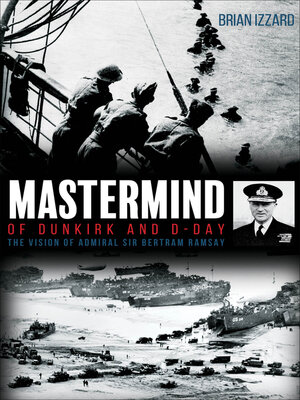
Sign up to save your library
With an OverDrive account, you can save your favorite libraries for at-a-glance information about availability. Find out more about OverDrive accounts.
Find this title in Libby, the library reading app by OverDrive.



Search for a digital library with this title
Title found at these libraries:
| Library Name | Distance |
|---|---|
| Loading... |
This detailed biography brings to life one of the greatest military heroes of WWII—and demonstrates why his contributions were crucial to Allied victory.
At the outbreak of the Second World War, Admiral Sir Bertram Ramsay masterminded the evacuation of some 330,000 members of the British Expeditionary Force from Dunkirk. He went on to play a crucial role in the invasion of Sicily and the planning and execution of the D-Day invasion, where he commanded the 7,000 ships that delivered Allied forces to the beaches of Normandy. All this from a man who had retired in 1938—only to be persuaded back to the service by Winston Churchill himself.
In 1944, Ramsay was promoted to Admiral and appointed Naval Commander-in-Chief for the D-Day naval expeditionary force. A year later, he died in a mysterious air crash. Though Ramsay's legacy has been remembered by the Royal Navy, his key role in the Allied victory has been widely forgotten. Now biographer Brian Izzard corrects this oversight, arguing that without Ramsay the outcome of both Dunkirk and D-Day—and perhaps the entire war—could have been very different.
At the outbreak of the Second World War, Admiral Sir Bertram Ramsay masterminded the evacuation of some 330,000 members of the British Expeditionary Force from Dunkirk. He went on to play a crucial role in the invasion of Sicily and the planning and execution of the D-Day invasion, where he commanded the 7,000 ships that delivered Allied forces to the beaches of Normandy. All this from a man who had retired in 1938—only to be persuaded back to the service by Winston Churchill himself.
In 1944, Ramsay was promoted to Admiral and appointed Naval Commander-in-Chief for the D-Day naval expeditionary force. A year later, he died in a mysterious air crash. Though Ramsay's legacy has been remembered by the Royal Navy, his key role in the Allied victory has been widely forgotten. Now biographer Brian Izzard corrects this oversight, arguing that without Ramsay the outcome of both Dunkirk and D-Day—and perhaps the entire war—could have been very different.







